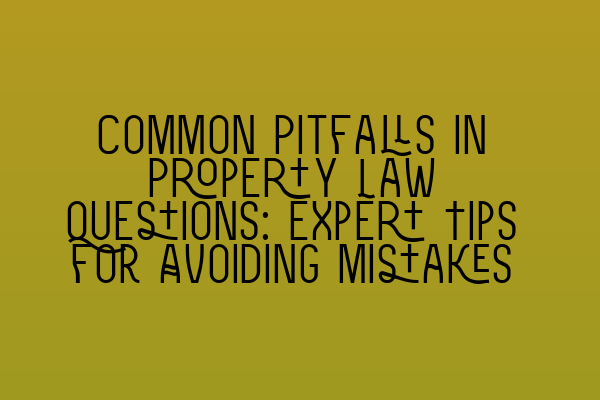Common Pitfalls in Property Law Questions: Expert Tips for Avoiding Mistakes
As a solicitor specializing in property law, I have come across numerous cases where clients have fallen into common pitfalls when dealing with property law questions. Property law can be intricate and complex, and it is crucial to be aware of the potential pitfalls in order to avoid costly mistakes. In this blog post, I will share some expert tips on how to navigate property law questions and avoid these pitfalls.
1. Lack of understanding of legal terminology: One of the most common mistakes in property law is the misinterpretation of legal terms. Understanding the correct terminology is essential to accurately comprehend property law principles. For example, confusing “freehold” and “leasehold” can lead to significant errors in property transactions. To avoid this pitfall, it is important to familiarize yourself with the proper legal terminology commonly used in property law.
2. Failure to conduct thorough due diligence: Property law requires meticulous research and investigation. Failing to conduct thorough due diligence can result in serious consequences. It is crucial to undertake proper searches, such as Local Authority Searches, Drainage Searches, and Environmental Searches, to uncover any potential issues or restrictions related to the property. This will help you identify any hidden liabilities or encumbrances that may impact the transaction.
3. Inadequate understanding of the law: Property law is continuously evolving, with new legislation and case law shaping its principles. Failing to keep up with the latest developments can lead to incorrect advice or interpretation of the law. Staying updated with legal updates and reading relevant case law is crucial to avoid pitfalls and provide accurate advice to clients.
4. Overlooking essential clauses in contracts: Property transactions often involve complex contracts that contain numerous clauses and provisions. Overlooking crucial clauses can have serious ramifications. It is vital to carefully examine and understand all aspects of a contract, including terms related to rights of way, restrictions, easements, and covenants. Seeking professional advice to review contracts thoroughly can help identify any potential pitfalls and protect your clients’ interests.
5. Neglecting to consider tax implications: Property transactions often have significant tax implications. Failing to properly consider these implications can result in unexpected tax liabilities for your clients. It is essential to have a solid understanding of the tax rules and regulations, including stamp duty land tax (SDLT), capital gains tax (CGT), and inheritance tax (IHT). Consulting with tax specialists or seeking professional advice when dealing with tax-related matters is vital to avoid pitfalls and ensure compliance with tax laws.
6. Ignoring the importance of good communication: Effective communication is essential when dealing with property law matters. Failing to communicate clearly and promptly with clients, colleagues, and other relevant parties can lead to misunderstandings and delays. Building strong communication skills and maintaining open lines of communication throughout the entire process is crucial to avoid unnecessary pitfalls.
7. Underestimating the importance of drafting precise documentation: Properly drafted documentation is paramount in property law. Neglecting to create precisely worded contracts, agreements, or leases can lead to ambiguity, disputes, and costly litigation. It is essential to meticulously draft all legal documents, ensuring that they accurately reflect the intentions of the parties involved. Seeking the assistance of experienced property lawyers or solicitors can help guarantee the proper drafting of documentation and avoid potential pitfalls.
By being aware of these common pitfalls and following the expert tips outlined above, you can navigate property law questions with confidence and avoid costly mistakes. Remember to stay updated with the latest legal developments, seek professional advice when necessary, and conduct thorough due diligence in every property transaction.
If you are preparing for the SQE exams and looking for practice materials, be sure to check out our related articles:
– SQE 1 Practice Exam Questions: Get valuable practice with our comprehensive SQE 1 practice exam questions.
– SQE 1 Practice Mocks FLK1 FLK2: Test your knowledge and prepare for the SQE 1 exams with our practice mocks.
– SQE 2 Preparation Courses: Join our SQE 2 preparation courses to enhance your understanding of property law and other relevant topics.
– SQE 1 Preparation Courses: We offer SQE 1 preparation courses to help you master the fundamentals of property law and other key areas.
– SRA SQE Exam Dates: Stay informed about the latest SQE exam dates to plan your preparation effectively.
Remember, property law can be complex, but with the right knowledge and guidance, you can successfully navigate its intricacies and avoid common pitfalls. Happy studying and good luck with your property law endeavors!
